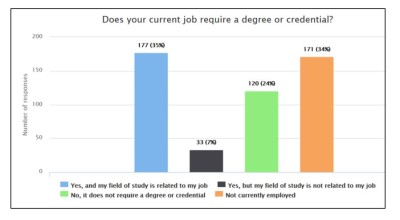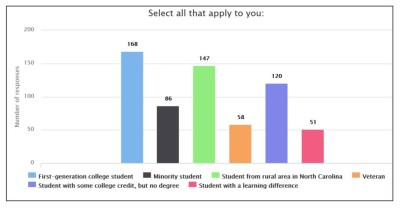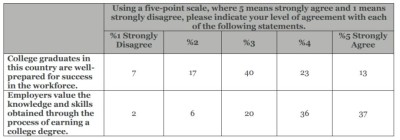The N.C. Center for Public Policy Research conducted an online statewide poll to survey respondents on the highest credential completed, student loan amounts, and reasons North Carolinians do not complete their degree.1
To provide a unique look at state-level responses, the Center’s survey was limited to North Carolinians. Some of the results provide additional insight into the state-specific story of how individuals are pursuing higher education and what types of barriers they are facing.
Posts this week highlight these poll results and also include public opinion on higher education issues from national surveys. See the first and second posts in the series.
Does your current job require a degree or credential? (Click on figure to enlarge)
- 35% of respondents said their current job requires a degree or credential and their field of study in school is related to their occupation. 24% responded their current job does not require a specific degree or credential.
Demographics of Respondents:
- The survey included multiple demographic groups. Respondents were asked to select all applicable groups, so some individuals are counted in more than one category. 168 respondents are first-generation students; 86 are minority; 147 live in a rural area of North Carolina; 58 are veterans; and 51 have a learning difference.

A national poll2 conducted by Gallup and the Lumina Foundation surveyed national opinions on the importance of post-secondary credentials, barriers to higher education, and levels of student debt.
- When asked for level of agreement with the statement, “College graduates in this country are well-prepared for success in the workforce,” 36% agreed or strongly agreed, while 24% disagreed or strongly disagreed.
- 73% agreed or strongly agreed that “Employers value the knowledge and skills obtained through the process of earning a college degree.”
- 81% of respondents answered that a job candidate’s knowledge and skill in a particular is “very important” to hiring employers, compared to the importance of the candidate’s major (very important for 47%) or school (very important for 31%).
A Strong Economy through Post-Secondary Education
Introduction Part One Part Two Part Three Part Four
Promising Programs Statewide: Fayetteville State University
Promising Programs Statewide: Elizabeth City State University
Promising Programs Statewide: College of The Albemarle
Promising Programs Statewide: Asheville-Buncombe Technical Community College
Promising Programs Statewide: Bladen Community College
Snapshot: Veteran and Military Students
Promising Programs Statewide: UNC-Greensboro
Promising Programs Statewide: Bennett College
Promising Programs Statewide: University of North Carolina at Charlotte
Promising Programs Statewide: University of North Carolina at Pembroke
The N.C. Center for Public Policy Research is grateful to numerous, generous supporters. Major funding for this project is provided by the Lumina Foundation for Education, with additional funding from the James G. Hanes Memorial Fund, and the Hillsdale Fund.
- Survata Online Survey conducted Nov.-Dec. 2014, Respondents: 501 adults living in North Carolina. Percentages may not total 100 due to rounding. ↩
- “Postsecondary Education Aspirations and Barriers,” The survey of 1,533 individuals was conducted in November and December of 2014 by Gallup on behalf of the Lumina Foundation. Available at http://www.gallup.com/poll/182462/postsecondary-education-aspirations-barriers.aspx. ↩





